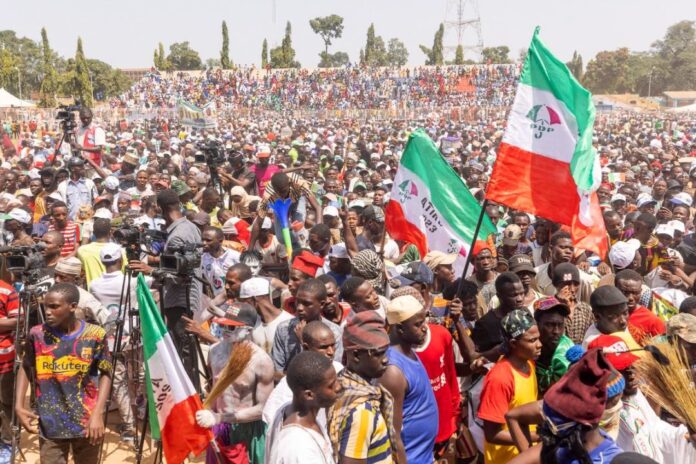Repercussions of early electioneering campaign activities, by Ayuba Ahmad
The nation’s political space has evolved over time into a permanent season of electioneering activities. Billboards are conspicuously displayed months or years ahead of polls, just as the mass media platforms are continually flooded with campaign messaging.
No doubt the steady and deafening drumbeat of political activities, deceptively labelled “party promotion” or “grassroots mobilisation”, has real, multiple and measurable impact on governance, accountability and the public interest.
Recent warnings from the Independent National Electoral Commission (INEC) and the Nigeria Police have pointed to a familiar diagnosis: we have a problem, and our existing rules and institutions don’t have what it takes to fix it.
Nigeria’s Electoral Act, 2022, stipulates that no campaign activities should start earlier than 150 days before an election, and must end 24 hours before polling. This statutory framework is clearly aimed at preventing the race from starting too early and allowing enforcement of limits on campaign financing.
The snag, however, is that the law contains weak or unclear sanctions for breaches of the 150-day rule. The electoral umpire, INEC has repeatedly said it lacks the legal tools to restrain premature campaigns. In other words, while the rule is there on paper, enforcement is hamstrung by a legal lacuna.
READ ALSO: Issues over the imprisonment of Simon Ekpa in Finland, by Ayuba Ahmad
Not long ago, INEC Chairman, Professor Mahmood Yakubu, described the proliferation of early campaign materials as “disturbing” and warned that, “these activities cripple the commission’s ability to monitor campaign finances.” Another institution charged with protecting the electoral process, the Nigerian Police has similarly admitted difficulties in monitoring campaign finances and enforcement of the regulations on campaign timings.
Since mid-2024, multiple large billboards have become conspicuous in Abuja and other cities, with messages highlighting the 2027 elections and, often featuring incumbent figures in promotional poses. Despite public disclaimers from the Presidency and party officials that they didn’t sponsor the materials, the presence and scale of the displays show organised spending and messaging.
There are four connected reasons why enforcement stutters. Firstly, the Electoral Act sets the 150-day rule, but there are teeth to bite if actors flout it. Secondly, many campaign materials are funded and executed by “third-party” groups (such as independent coalitions, think tanks or media houses), and this makes it harder to tie spending to a candidate or party for legal purposes.
Thirdly, enforcement agencies such as the INEC and the Police depend in large measure on political actors, the government, for resources and cooperation. Where incumbents benefit from early visibility, the tendency for aggressive enforcement is blunted. In such a situation, enforcement becomes selective, and concomitantly, the relevant institutions get weaker.
Finally, political gladiators are attracted to the ever-multiplying plethora of online platforms because their messaging goes viral at a lower cost. This brings up the question of whether existing campaign-timing rules can remain effective in view of the fact that the law was written before this tsunami of low-cost, high-reach digital campaigning.
READ ALSO: Perspectives, other things to know about the looming August 1st nationwide protest, by Ayuba Ahmad
Three practical reforms would make a real difference. First, give INEC real sanctioning power for premature campaigns. The commission has already called for amendments. The National Assembly should move urgently to close the legal gaps that leave the 150-day rule unenforceable. Legislative changes should include explicit penalties for early campaigning and a mechanism for swift administrative enforcement of penalties such as fines or takedowns.
Secondly, as it is the practice in developed democracies that the country is emulating, the law should be amended to allow for holding principals accountable for third-party spending. This implies requirements for transparency of groups undertaking political advertising and the INEC is empowered to attribute third-party spending to a principal when coordination or financial links exist.
Thirdly, there is the urgent need to update the rules for digital and out-of-home advertising as well as enhancing the powers of regulatory authorities on takedown. This demands that regulatory bodies are adequately resourced to enforce quick content takedowns and trace digital funding.
Effective control, observance and adherence to election campaign timings is critical in entrenching the democratic tenets of equity, fair play and providing a level playing ground for participating political parties and individuals in electoral contests. In situations where election campaigns are left unhinged, anarchy is bound to set in place of sanity. This is because of the undue advantages conferred to the incumbents and those with greater financial muscle.
There has been too much lawlessness, bordering on impunity, vis-à-vis the observance of extant laws that regulate election campaign timing frameworks in the country. For instance, even when it is about two long years to the next election season of 2027, the political atmosphere is already overcharged with campaign activities. One of the negative consequences is, inevitably, the abandonment of governance to politicking by elected officials in the pivotal arms of government: the executive and the legislature. In the scenario, there is no gainsaying that the citizens are those who bear the brunt.
Follow the Neptune Prime channel on WhatsApp:
Do you have breaking news, interview request, opinion, suggestion, or want your event covered? Email us at neptuneprime2233@gmail.com





